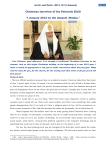Статьи журнала - Arctic and North
Все статьи: 972
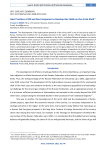
Best Practices of Oil and Gas Companies to Develop Gas Fields on the Arctic Shelf
Статья научная
The development of the hydrocarbon potential of the Arctic shelf is one of the priority tasks for Russia, forming the conditions for its strategic presence in the region. Russia's official energy documents stipulate the need to increase oil and gas production in the Arctic, including offshore production, to ensure the stable operation of the country's oil and gas complex in the long term. However, the development of hydrocarbon fields on the Arctic shelf is a serious technological challenge for the domestic oil and gas industry. While offshore oil production in the Russian Arctic is already underway, natural gas production remains a promising future target. The article analyses the current gas projects on the Arctic shelf in terms of their technological complexity and unique solutions, and the strategies of operators to attract foreign participants to the project. We consider these in the contexts of technological issues, organizational features, securing foreign investment. The author believes that the provisions and conclusions of this study will help add to the comprehensive picture of the foreign oil and gas companies experience engaged in natural gas production on the Arctic shelf, which will minimise the errors and risks in the development of hydrocarbon resources on the Russian Arctic seas shelf.
Бесплатно
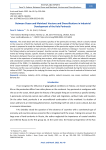
Статья научная
The article deals with the economic specifics of the peninsula’s territory, which is closely related to the resources of both the mainland and the ocean. Using the example of the Murmansk Oblast, an approach is proposed to study the industrial development of the peninsular region in the Soviet period, taking into account the competition of two versions. One of them was aimed at creating an “oceanic” economy – the fishing industry and marine transport. Another version served the “mainland” economy, represented mainly by mining industry. Specific historical materials are used to examine the pendulum effect, i.e. the fluctuations between these two versions and the formation of prerequisites for diversification. Of particular interest is the experience of combining two versions, which appeared in 1923, when an industrial transport and colonization combine was created on the basis of the Murmansk railway, and later, during the industrialization of the 1930s. It is debatable whether the two old versions were successfully transformed into the third “ocean-mainland” one, based on the idea of the integrated development of the resources of the Kola Peninsula and the seas surrounding it, which was most noticeably manifested during the Soviet economic reform of 1957. The prospects for studying this issue may be related to the use of methods of historical and economic analysis.
Бесплатно
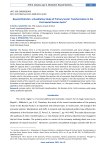
Статья научная
The Russian Arctic is at the epicentre of economic, environmental, and social changes. At the same time, the peripheral character of the territory, its strong orientation on primary sector makes the region extremely volatile to suchlike shifts. The study concerns primary sector transformation in the Post-Soviet period when after 1991 significant changes in the economy were observed. The main aim of the paper is to identify the specifics, features and development prospects of the recent primary sector transformation in the Russian Arctic. The statistical methods do not reflect the full picture of the transformation. Firstly, Russia has switched to UN national accounts system only in 1994. Secondly, the Arctic statistics after 2009 for regional level is unavailable. That is why the main method of the research is the expert survey method. The results of the study demonstrate the dominant role of the primary sector and the strong dependence of Russian Arctic regions on these activities. The study identifies the key factors and drivers of the transformation, a specific position of the oil and gas sector and the role of natural resources to be traditionally used in the primary sector. Despite the positive role of economic diversification in the long-term economic development, the corresponding effect for the Arctic regions is not fully expressed. The methodological novelty of the research is an unconventional research method of investigating primary sector transformation on the regional level in the Post-Soviet Russian Arctic, i.e. the expert survey. The method can be applied to other countries and industries.
Бесплатно
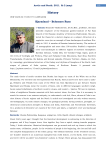
Статья научная
The main thesis of article consists that Russia has begun on coast of the White sea as Rus Belomorsky. For the first time the hypothesis that Ryurik, Sineus and Truvor have come to Ladoga, Belozero and Polotzk from coast of the White sea from Bjarmland is put forward. Names Bjarmland and Russia mean the country of bears, only in different languages: southern neighbours named inhabitants of northern country uruses, and western − bjarms. Till now in representation of neighbours Russian associate with their ancient totem, the bear. Rus it is necessary to search for sources in an extreme antiquity; to understand a role Arii, Slavs, ethnos of Celts in ancient history of Arctic regions and the North. In article are investigated not only written sources, the bibliography, but also climate changes, the geological periods; having artefacts, petroglife, architectural constructions (temples in Russia and India, Solovetsky and Novodvinsky fortresses, etc.), products of decorative art; names of the rivers and lakes, a vegetative cover and landscape Belomor.
Бесплатно
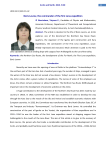
Boris Lavrov, the commander of the first Lena expedition
Статья научная
The article is devoted to the life of Boris Lavrov, an Arctic explorer, one of the directorsof the Northern Sea Route Headquarters, the organizer of the Igarka port construction and Kara expeditions, the commander of the First Lena expedition, unjustifiably repressed and executed. Much attention is paid to the First Lena expedition aimed at sending ships with cargoes from Arkhangelsk to the Lena River delta.
Бесплатно
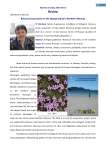
Botanical Excursions on the Sørøya Island in Northern Norway
Статья научная
Bilingual guidebook “Botanical excursions on the northern Sørøya (Finnmark, Norway)” is presented in the article.
Бесплатно
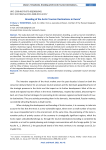
Branding of the arctic tourism destinations in Russia
Статья научная
The study deals with the issues of tourism destinations branding, as well as tourism multidimensionality and tourism destination identity in the Russian Arctic. The factors determining the promotion and branding of tourist destinations in the Russian Arctic are considered in correlation with the fundamental principles of sustainability in Arctic tourism. The relationship between state policy and socio-economic development of the Arctic regions of Russia is considered, in particular, in the aspects of Arctic tourism development. Dialectical, logical, theoretical and empirical methods were conducted for this research. The article defines the conditions for increasing the competitiveness of the domestic tourism product in the Arctic, lists tourism facilities, territories and tourism products that are of the most expressed interest to Russian and foreign tourists. The factors affecting the competitiveness of the tourism product in the Russian Arctic are identified. The article presents the components of the tourist destinations image in the Russian Arctic, which may become the basis for the formation of a strategy for branding tourism in the Arctic regions. The conclusion is drawn about the need for an umbrella brand creation for the Russian Arctic. The necessity of creating conditions for the professional implementation of tourist personnel in the Arctic regions of Russia and the influx of labor resources from urbanized and oversaturated territories to the Arctic with the aim of the integrated development of tourism is substantiated.
Бесплатно
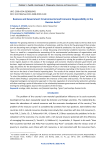
Business and government: environmental and economic responsibility in the Russian Arctic
Статья научная
The growing interest in environmental problems on the part of society leads to the fact that more and more attention is paid to the activities of enterprises, and the criteria for the greening of their production are becoming more stringent. With the growth of industrial production, the scale of the negative impact on the environment increases, so simply discussing environmental problems becomes insufficient. There is a need for a comprehensive accounting of the environmental performance of organizations and the development of measures to compensate for the resulting environmental damage. The article examines the issues of environmental and economic relations between business and government in the Russian Arctic. The purpose of this study is to form a theoretical approach to solving the problem of greening the Arctic regions based on the analysis of the ecological and economic relations between government and business. Legal and economic instruments for regulating environmental protection in Russia, as well as strategic documents for the development of the Russian Arctic in the field of ecology are analyzed. An assessment of the environmental and economic responsibility of companies operating in the Russian Arctic is carried out on the basis of non-financial reporting data. The results of the analysis show that the presented non-financial information is not transparent enough, and the level of business responsibility is rather low. To solve the problem posed, the authors propose a theoretical approach to building a "green" partnership, which allows finding a compromise between the interests of the state and business. The formation of an integrated ecological and economic approach in the state regulation of environmental protection activities will allow reaching a point of bifurcation in the relationship between government and business and thereby leveling the anthropogenic load on the ecosystem of the territory.
Бесплатно
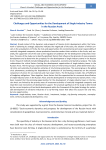
Challenges and Opportunities for the Development of Single-Industry Towns in the Russian Arctic
Статья научная
Broad context of the dynamics and prospects of Russian Arctic development within the framework of achieving its strategic objectives indicates the magnitude of the tasks, the solution of which consists in the actualization of, firstly, the risks and opportunities for environmental and social responsibility of vertically integrated companies, whose production branches conduct their activities in the Arctic, and, secondly, the supportive role of the state as the regulator of conditions for the development of business initiatives. The aims of the study are to identify significant factors that influence the dynamics of socio-economic development and to determine the prospects for the development of single-industry towns in the Russian Arctic. Research methods include bibliographical, comparative, economic and statistical analysis. The study substantiates the critical factors limiting the development opportunities of single-industry towns in the Russian Arctic. The first group is represented by the state of mineral resource base, which determines natural limits and cyclicality of production activities of city-forming enterprises. The second group is the global crisis phenomena, producing the dependence of production of city-forming enterprises on the external conjuncture of prices for raw materials and main export items. The third group includes risks of fulfilment of budgetary obligations. Taken together, these factors limit the opportunities for economic diversification of single-industry towns in the Russian Arctic and the development of entrepreneurial activity there. It has been revealed that the promising opportunities for the development of single-industry towns in the Russian Arctic are limited by the priority areas of investment activities of vertically integrated companies and imperfect state instruments of development support. The practical significance of the study is determined by the current trajectory of territorial development within the framework of the global strategy for sustainable development of extractive industries of a city-forming nature that takes into account not only risks, but also opportunities.
Бесплатно
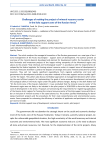
Статья научная
The article analyzes the managerial innovation of the Russian government on a new type of territorial management of the Arctic macroregion - support zones of development. The authors present an overview of the mineral deposits developed and planned for development within the boundaries of the Kola Peninsula and investment projects of the largest mining companies of the Murmansk region and, above all, the project “Kola Chemical and Technological Cluster” in accordance with the requirements developed by the federal regulator for forming mineral resource centers in support zones of development in the Arctic Particular attention is paid to the deposits of strategic and scarce minerals attractive for private investors. They will not require significant expenditures from regional authorities and local selfgovernments for development activities or any other methods of the state support and are socially significant for the region. The authors also discuss methodical approaches to management decisions when selecting the most efficient projects for implementing, the goals of socio-economic development and ensuring the ecological safety in the Arctic region under the global climate changes. Basing on the draft federal law “On the Arctic zone of the Russian Federation”, it was concluded that the mineral resource center of the Murmansk region was not likely to be included in the pilot project in 2018-2020 to form the Kola support zone of development in the Arctic. Proposals on harmonizing the requirements for registering applications of the Russian Arctic regions for forming the mineral resource center of the Kola support zone with the order on inclusion of mineral reserves in the state balance list. The authors justified methodology for developing investment projects and the procedures for their state comprehensive and environmental assessments. Some proposals for enhancing the efficiency of activities of applicants and participants in the support zone are made.
Бесплатно
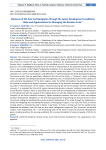
Статья научная
The uniqueness of today's social processes triggered by the COVID-19 pandemic determines the lack of insights into the transformation of the socio-economic space of the Russian Arctic. The purpose of this article is to review the past, recent, and future conditions for development and management of the Russian Arctic, considered in the context of the unfolding crisis of a non–economic nature and its consequences. The methodological peculiarity of the review is presentation of the phenomenon of the current crisis in the context of interrelated fundamental problems of the development of the Russian Arctic, the new economic reality, which makes it difficult to reliably predict the future. This naturally led to the substantiation of a series of contradictions and difficulties in implementing the declared development goals of the Russian Arctic, that are specifically reflected in the title of the article — "chimeras", which in biology means an organism consisting of genetically heterogeneous cells. A statistical description of the specifics of socio-economic development of the Arctic regions under the COVID-19 pandemic has been carried out in the context of review of the support measures, examination of the economic structure and the corresponding scale of "disconnection" of the regions' economies during the period of isolation and the subsequent recovery. It is revealed that the Arctic regions demonstrate greater economic resilience compared to the overall Russian situation, which is associated not so much with the strengthening of stabilization measures at the federal level with the support of the regional level, but with the fundamental reasons — the relative simplicity of the Arctic extractive economy, higher population incomes, low level of small and medium business development. Navigation on the risks and opportunities of governing the Russian Arctic has been carried out, linking the fundamentals and the practical implications of the study through the traditional rationale for navigating and considering the practice of managing an object, in our case, the Arctic, as well as routing, which is, choosing the path to follow. In particular, it makes a strong case that the pandemic has deepened the problems and risks that are also major management targets for the "precursor" period and creates a new hypothetical risk — the diminishing scale of the Arctic's social and economic development goals, including practices for securing conditions for increased standards of living and quality of life for its people.
Бесплатно
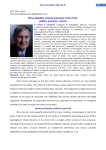
China, Republic of Korea and Japan in the Arctic: politics, economy, security
Статья научная
China, South Korea and Japan are actively pursuing scientific, economic and political activities for the development of the Arctic, the Arctic resources, ensure security in it, seeking to increase its role in the Arctic Council, cooperating and competing-Rui with other countries. The paper stresses that China is in the final stage of preparation of its Arctic strategy, however, it is noted that the Arctic is important for China, but not a top priority of its foreign policy. The priorities of the Republic of Korea in the development and exploration of the Arctic, as shown by the analysis conducted by, yavlyutsya: research, the use of the Northern Sea Route for the transportation, receipt of orders from Arctic countries for Korean shipyards for the construction of offshore oil platforms, special vessels and icebreakers; development of relations with Russia. Japan is a growing interest in the Northern Sea Route, scientific research in the Arctic. We consider Japan's attempts to resolve the territorial issue with Russia. Japan's Ministry of Foreign Affairs supports the establishment of a new international structure in the Arctic, which was formed not on a geographical basis, and by the presence of economic interests in the region. Seoul supports the establishment, together with Russia a regional mechanism of multilateral cooperation in the Arctic, with the code name “Asia-Pacific Arctic Council”.
Бесплатно
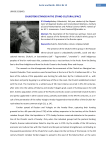
Chukotskii ethnos in the ethno-cultural space
Статья научная
The description of the historical, spiritual, moral and ethnic aspects of the formation of the chukchi ethnic group in the context of its presence in the Russian space.
Бесплатно
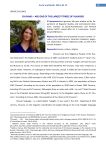
Chuvans – are one of the largest tribes of yukagirs
Статья научная
Identified and presented chuvans number, location and contemporary historical homeland, paganism, shamanism, rituals, traditional crafts, as well as the current situation.
Бесплатно
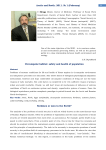
Circumpolar habitat: safety and the health of population
Статья научная
Problems of extreme conditions for life and health of Homo sapiens in circumpolar environment and adaptation processes are discussed. Also shows limits of biological (physiological) adaptation mechanisms. Extreme and hypo comfortable circumpolar conditions of living are not the basic reasons of early mortality. But «cold factor» is considered to be very sufficient reason of primary infant and adult morbidity. Finally, we still don’t know all mechanisms of influence of extreme conditions of North on endocrine system and obesity, reproductive system of women. From the biological equivalence position noospheric paradigm is putted forward into the Arctic and Russian North development.
Бесплатно
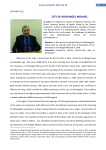
Статья научная
In this article the initial history of Arkhangelsk, which owes its calendar with date of foundation of the monastery of Archangel Michael in 1388.
Бесплатно
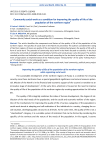
Статья научная
The article identifies the components and factors of the quality of life of the population of the northern region. The specifics of social work in the North are presented. The authors considered the rating of Northern regions of Russia on quality of life and noted the relationship between the quality of life with a form of social work. The potential of community social work in the North focused on activities in the local community and aimed at strengthening individuals, families and social groups is also discussed. The authors revealed priorities and individual areas of social work according to the territorial principle in the develop-ment of approaches to implementation of the Federal project “Strong family” of the party “Edinaya Rossi-ya” (“United Russia”) in the Arkhangelsk region.
Бесплатно
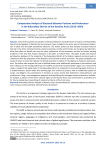
Статья научная
The article examines the specifics of electoral behavior and preferences of voters in the Kalevalskiy District of the Republic of Karelia from the moment it was included in the Arctic zone of the Russian Federation in 2015 until the 2024 presidential elections. The author points out that, despite increased research interest in the Arctic national territory, electoral practices and the will of voters are not given due attention, while they allow to identify not only the value preferences of the electorate, but also to localize existing problems in the area that require measures to be taken to resolve them. The paper studies the election participation behavior of the residents of the Kalevalskiy District at the federal, regional and local levels in comparison with the population of the Republic of Karelia and its Arctic territories. The paper establishes the values of voter turnout, the indicator of protest potential in relation to the degree of elections’ alternativeness. The author also analyzes the role of political powers that traditionally participate in the elections and their influence on the voting preferences of residents of the Arctic Karelian border region. As a result of the study, a model of the typical voter in the Kalevalskiy District is created (in terms of demographic structure, it is predominantly a person older than working age, not inclined to protest, with an established system of values, and diligent civic participation in elections at various levels) that determines voting behavior and preferences. Using a neo-endogenous approach and identifying the cleavages structures based on multifactor analysis, a pattern of the Arctic national region of the Russian Arctic was constructed as a possible case for future comparative researching of national territories of the Arctic zone.
Бесплатно
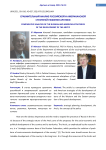
Comparative analysis of the Russian and American strategies of the development of the Arctic
Статья научная
The article is a comparison of Russian and American strategies of the development of the Arctic zone and analyzed the mental patterns of the Western and the Eastern perception of the spacel development.
Бесплатно

